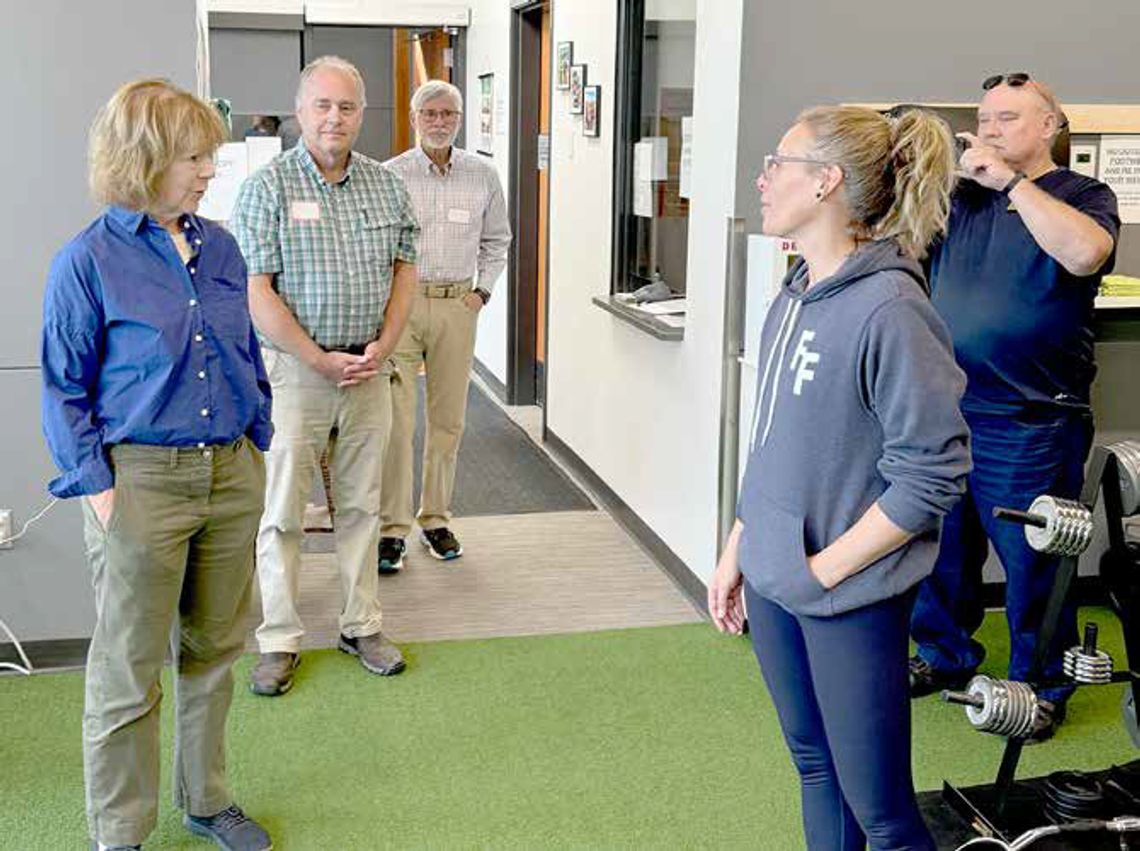U.S. Sen. Tina Smith (D) was in Ely Wednesday, touring The Hub, seeing the results of a federal appropriation she helped secure, and learning more about the child care challenges in rural Minnesota.
Smith spent a few minutes with pre-school children served by Happy Days Learning Center as part of an hourlong visit to the renovated building in Ely’s business park, which was repurposed and subsequently reopened in August.
Now owned by the Ely Area Community Foundation, the former Minnesota Department of Revenue building has now been remodeled to serve several tenants, including the child care operation.
Smith was instrumental in helping to land a federal appropriation of $1.2 million to remodel the building, as it transformed from a space with dozens of office cubicles to one that now houses a workout center, offices, gathering space and Happy Days, which has room for up to 46 children.
The grant was one of the topics when Smith addressed Happy Days officials and representatives of the EACF during Wednesday’s tour.
“We really punch above our weight in bringing projects back to Minnesota,” said Smith. “And part of it is our staff is really good at getting projects together that have the best chances at success, and Senator (Amy) Klobuchar and I work closely together on these appropriations. We love to be able to make this work.”
Happy Days serves children including infants as young as six months to those up to six years of age.
About 30 children are currently enrolled but that number is growing, according to Happy Days board president Mandy Petersen.
Both Petersen and Happy Days board member Allie Pace touted the impact of the project and Happy Days’ transition from a preschool to a full-fledged child care facility.
“This is a facility that everyone comments on and there are comments that ‘I can’t believe it’s in Ely,’” said Petersen. “It’s great and it’s going to change the trajectory for our town and young families in town. We’re very grateful.”
A child care shortage in Ely made Happy Days a natural partner for the new effort, and renovations were made to accommodate its needs - including rooms for preschool children and infants as well as an outside play area.
For several years, child care has been on the radar of area leaders and a lack of it has been cited as an obstacle for area employers as well as families.
While Happy Days is filling a void in the community, Smith asked about the future and potential challenges and Pace pointed to efforts to keep the facility both fully- staffed and affordable.
“Retaining staff and being able to provide some sort of staff benefits (is a challenge),” said Pace. “Right now we don’t provide health insurance or even a stipend for it. We are similar in pay as the paraprofessionals in the school district but they receive benefits. We want to be able to keep our rates affordable and still be able to provide decent, slightly above average living for our teachers.”
Pace added that “tuition costs are paying for everything and there’s only so much that people can afford.”
Smith was sympathetic to the concerns and said she’s motivated to provide relief.
“This is a systemic challenge that we have to work on,” said Smith. “The business model doesn’t work. It’s too expensive and even with that expense it doesn’t allow you to even provide benefits. Think about what it would be like if we had a similar business model for third grade. It would be the same problem. It wouldn’t work.”
Smith said she is working “on several pieces of legislation to get more money into the system so people who are working as educators can get paid more.”
Happy Days program director Kathleen Floberg walked Smith through the facility, where she witnessed infants crawling around and both sang and visited with preschoolers.
“You’re getting them off on a start that’s irreplaceable,” Smith said.
The tour also included a look at the spaces occupied both by Northwoods Partners and Well Being Development, as well as the workout facility operated by Functional Fitness, where owner Michelle Moore showed off her space and had fruit smoothies made for Smith and her staffers.
Dave Marshall and Kurt Soderberg of the EACF also showed Smith the spacious community meeting room at the facility and talked about the next phase of the project the potential development of a swimming pool and aquatic center on the south side of the building.
Marshall noted that the primary obstacle remains finding a way to cover operating costs of the pool and associated amenities.
“People laugh when I say this but getting the money to build is easy, but covering operating expenses is a challenge,” said Marshall. “We know it won’t cash flow. There aren’t enough people in town.”
Marshall said the EACF is exploring possibilities to underwrite annual operating expenses and give Ely a community pool for the first time since the Ely school closed its pool in 2006.
Soderberg also detailed the history of the project and how it evolved from initial attempts to establish a community recreational facility, first at the Ely school campus and later at Ely-Bloomenson Community Hospital.
The stars aligned of sorts when the state put the Revenue Building for sale as its employees moved to working from home in the aftermath of the Covid-19 pandemic, and the EACF - via the city of Ely - bought the building for just over $1 million.
.jpg)










